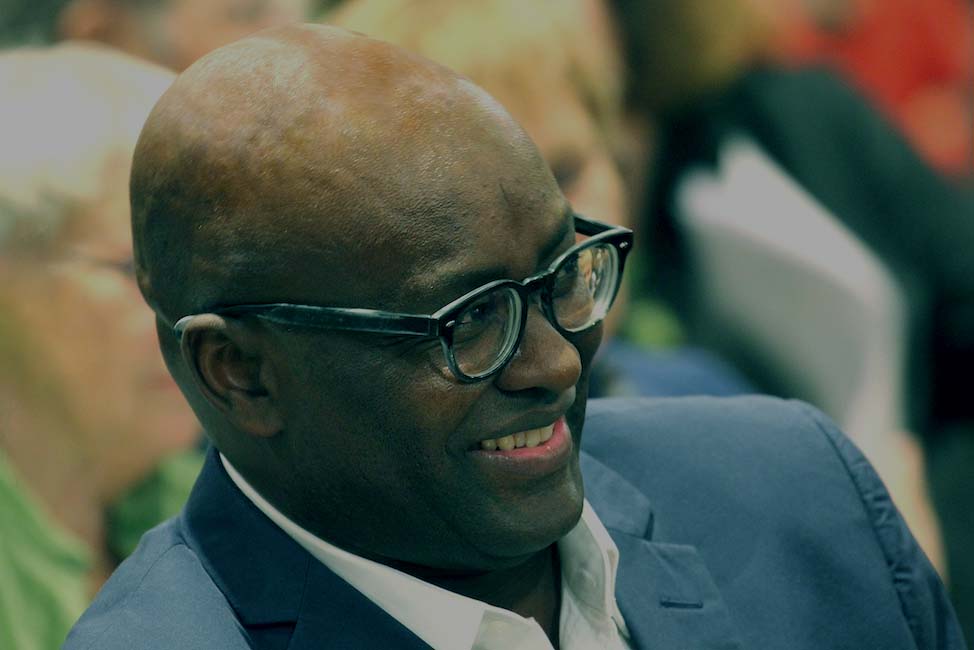In April 2020, the German government’s anti-Semitism commissioner, Felix Klein, declared in the press that the Cameroonian historian Achille Mbembe was ‘not suitable’ as opening speaker of the Ruhrtriennale on account of his anti-Semitic positions. This has led to a heated debate—the anti-Semitism accusation against Mbembe was countered by an accusation of racism against Klein and others—with no convergence of positions in sight. Initially, the same few passages from Mbembe’s work—a two-page foreword, a nearly thirty-year-old travelogue, a few passages from books and essays—were invoked to discuss whether Mbembe made use of anti-Semitic lines of argumentation. Critique of his works’ intrinsic discourse was almost non-existent, as was contextualisation; framing through the accusation of anti-Semitism determined the view of Mbembe’s entire oeuvre. Since the isolated interpretation of short texts at some point no longer yields much of anything, criticism has shifted to postcolonial theory as a whole. But this theory has also been narrowed down to its positions on the Holocaust and Israel.
If debates fail to progress, it is often because their questions are the wrong ones or the presuppositions of the questions have not been clarified. This is the case with the question regarding Mbembe’s anti-Semitism. The norm seems clear, only subsumption is needed. A hermeneutics not so much of suspicion, as Aleida Assmann wrote, but of certainty about one’s own moral position.
Why is the criticism limited to the accusation of anti-Semitism without taking an interest in the context? Why the attempts to derive Mbembe’s philosophy from his position on the Holocaust and Israel, rather than vice versa? Why do critics accuse him of not having an adequate concept of anti-Semitism if they themselves do not aspire to an adequate understanding of postcolonial theory? What is gained by accusing Mbembe of lying, as if the issue were a matter of accusation rather than argument, condemnation rather than comprehension?
A statement by Felix Klein offers an explanation for the disinterest in a change of perspective: ‘Something that is wrong from a German perspective does not become right by coming from without’. Accordingly, the issue has nothing to do with understanding Mbembe’s (non-German) point of view and there is no need to listen to him. The question is not even whether Mbembe is anti-Semitic in an objective sense, and it is therefore also pointless to defend him against these accusations. This is all about the ‘German point of view’, which of course is then to be imposed on Mbembe in turn.
The fallacy inherent in this conclusion makes the failure of the debate understandable. The critique starts with the special responsibility of the Germans for the Holocaust and postulates a resulting specifically German view, a German narrative, a German identity and a German responsibility. It ignores the particular origin of this view and turns it into a universalism. The critique then imposes this universalism on everybody, including those who do not share in the particular German experience and responsibility. But since this universalism derives from German responsibility, Germans remain in control of the debate. Klein stated: ‘If Mr. Mbembe, as a foreign academic, intervenes in such a debate and also formulates misleading sentences, he must then clarify this’. This duty of clarification implies that the debate must be a German one. Why so?
German participants in the discussion demand of others not only that they acknowledge the ‘achievement’ of a specifically German ‘culture of remembrance’, but also that they make it the foundation of their own thinking and speaking. Since we Germans are responsible for the Holocaust, we take the moral right to dictate to others what they have to say about it. ‘An absolutisation of one’s own experience always leads to a relativisation of the experience of others’, writes one critic of Mbembe, apparently failing to recognise that this applies less to Mbembe and more to himself.
The deep irony underlying this is that with this universalisation and monopolisation of an originally European perspective a central theme of de-colonial criticism of Western universalism has been identified. Decoloniality is not about the political overcoming of colonisation through independence, but instead about the epistemic overcoming of coloniality as a concept of domination that can also emerge and persist without political colonisation. Notable proponents of such theories do not seek to turn slaves into masters and grant a universal prerogative of interpretation to Africans instead of Europeans; they aim at overcoming such epistemic relations of domination as a whole. As a consequence, they do not reject the European Enlightenment as such—many of them draw on European thinkers of universalism themselves; the reference to Kant in the title of Mbembe’s Critique de la raison nègre is no coincidence. What they do accuse Europe of is its amnesia regarding the conditions under which European universalism was born. What they do criticise is that Europe, with its universalism, imposes its own horizon on others instead of allowing pluralism.
A pluralistic hermeneutics would have to open up other foundations for comprehension than the German one and create mutual avenues of understanding. From a European perspective, the Holocaust is also unique because it marks the collapse of modernity and humanism. From a de-colonial perspective, however, modernity and genocide have been two sides of the same coin from the outset: Genocide and colonisation have always been legitimised by modernity, the superiority of the colonisers over the colonised. From this point of view, what is special about the Holocaust is only that the genocide has returned to Europe; the singularisation of the Holocaust then entails prioritising European experiences over non-European ones.
Defenders of Israel complain that of all countries the only modern and democratic state in the Arab world is being criticised. De-colonial critics see such arguments in the name of modernity and Israel’s alleged superiority over its neighbours as elements of the very same coloniality that was invoked for the colonisation of America and Africa.
One does not have to find this perspective objectively correct—it stems from a particular horizon. One does not have to substitute it for one’s own—perhaps one even cannot do so. And of course one may (as has been the case in academia for quite some time) discuss whether this misinterprets the Holocaust and Israel, or even makes use of anti-Semitic leanings and arguments. If, however, the discussion assumes specifically European experiences as generic and ignores the fact that those criticised in this fashion are arguing from a different horizon, coloniality will be perpetuated and the debate that is in fact necessary rendered impossible. One would not only have to discuss about Mbembe, but with him (and others), instead of tying his participation to discourse prerequisites that presuppose what must be proven.
If critics regard the anti-Semitism accusation against Mbembe as clearly justified and the accusation of racism against themselves as clearly unfounded, can they not understand, precisely on this basis, why it could be the other way around for others? The anti-Semitism accusation absurd, the racism accusation manifestly correct? And wouldn’t such an insight be a good foundation for a truly open discussion aimed at mutual understanding rather than mutual accusations?
Mbembe surmises that he is not being listened to in Germany because he is black. It is more likely that he is not being heard because we cannot or do not want to distinguish him from Alexander Gauland (co-founder of the political party AfD). It is significant that the Mbembe debate is linked with the 1986 Historikerstreit (historians’ dispute), as if there were no difference between the German Ernst Nolte’s attempt to relativise German responsibility and the African Mbembe’s attempt to place the Holocaust within a broader context of responsibility. Postcolonial theory does not, however, release us so easily from responsibility for our past, and we ought not to make it so easy for ourselves to reject it. If our German identity makes it impossible for us to engage in dialogue with postcolonial theory, we must ask ourselves whether we have really learned the lessons of the Holocaust.
Image: Heike Huslage-Koch, CC BY-SA 4.0, via Wikimedia Commons

